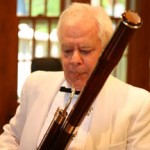
Those of you who have attended Midsummer’s Music concerts for any period of time expect to hear a work or two by well-known composers. But, you are also used to enjoying some musical discoveries by lesser known lights. This routine has developed over the years because we have uncovered so many fabulous compositions by composers who are surprisingly unknown. It has become something of a trademark for us to unearth works, often from the distant past, that really deserve to be heard. Our audiences seem to enjoy the opportunity to hear such pieces side-by-side with those of the masters. You have indicated that you like to broaden your musical perspectives across the years and continents.
However, despite the success of this approach, our concerts this weekend (June 29 and 30) will feature works by three of the most familiar of household names. Haydn, Mozart, and Beethoven are the triumvirate who define the classical period in music, and they will be with us at the Sturgeon Bay Moravian Church on Friday and the Sister Bay Moravian Church on Saturday. The classical period starts with the death of J. S. Bach in 1750 and extends into the 1820s. It is the period when instrumental music truly came into its own, and the music by its chief exponents, Haydn, Mozart, and Beethoven, is some of the finest ever written.
One of the things that interest me the most, is the fact that all three of these creative geniuses knew one another. They represent three different generations, which may account for the fact that they could all respect each other. Haydn was the elder statesman of the group. He was born in 1732, the same year as George Washington. Mozart wasn’t born until 1756, so he could have been Haydn’s son. Beethoven came along in 1770, and was clearly the new kid on the block, but the one with perhaps the longest coat tails. Haydn and Mozart had a rather special relationship. Mozart dedicated a group of his string quartets to Haydn as a tribute, not an easy gesture for a brash young wunderkind. Haydn paid the tribute back. Beethoven studied with Haydn for about a year. He also met Mozart and, perhaps, took a few lessons with him.
Wouldn’t it be great if we could have sat in on those encounters? Can you imagine just hearing a conversation between Beethoven and a friend talking about the music of Haydn or Mozart?
One of the moments in music history that intrigues me most is a documented evening of string quartet playing in Vienna that involved four highly respected composers of the time, Mozart, Haydn, Karl Ditters von Dittersdorf (what do you suppose they called Karl in grade school?), and Jan Vanhal (a Czech composer who had moved to Vienna). What I would pay to have been a fly on the wall that evening.
I imagine the conversation during the evening something like this. [Mozart] “Karl, I think your counterpoint is covering up my melody.” [Haydn] “Hey, Amadeus, you are dragging. You sound like you are even older than I am!” [Dittersdorf] “Vanhal, did you bring those awful Czech kolaches for snacks? You know I much prefer some good Viennese sausages.” [Vanhal] “Haydn, who does your wig? I think mine needs some attention. And as for you, Dittersdorf, we are having some good Czech Pilsner beer, no thanks to you.”
It sounds like they could have been in Wisconsin, except I bet they had some Sacher Torte to polish off the evening. Regardless, Mozart, Haydn, and Beethoven are having a conversation of sorts June 29 and 30. Mozart’s Divertimento for Strings in D Major is one of the most vivacious pieces you will ever hear. He was only sixteen when he wrote it, and I defy you to sit still while it is being played. Haydn’s Symphony No. 104 is usually played by a full orchestra, but you will be amazed at its power and clarity when the version that was arranged by the impresario and violinist who brought Haydn to London toward the end of his life is performed by Midsummer’s Music. To conclude the program, we turn to a rarely played masterpiece by Beethoven written in the early 1800s, shortly before he wrote the great Eroica Symphony. This work for string quintet delights with a youthful vigor and enthusiasm which is totally captivating. Concerts start at 7:30. For tickets or information please call 920.854.7088, or simply click here to order online.
